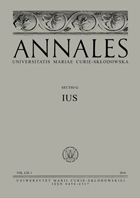Czy prawo Polski Ludowej było prawem słusznym?
Was the Law of the People’s Republic of Poland Equitable Law?
Author(s): Wojciech DziedziakSubject(s): Constitutional Law, Civil Law, Existentialism, Philosophy of Law, Government/Political systems, Philosophy of Law
Published by: Wydawnictwo Naukowe Uniwersytetu Marii Curie-Sklodowskiej
Summary/Abstract: The article discusses the issue of equitability of the law of the People's Republic of Poland. The author bases the theory of equitable law ou the following values: truth, good, justice and human dignity. Equity, thus understood, pertains to the processes of both making and applying law. The article defines the above-mentioned values. It adopts the basic classical understanding of truth as the adequation of intellect to things (veritas est adaequatio intellectus et rei). Creating norms involves the truth about the reality, induding the truth of the existential dimension of the human being that is to be (should be) the starting point for making equitable law. Good is understood as the good in the moral sense as the good of man and the common good. Justice is understood in the classical sense, i.e. it is about 'rendering every man his due' (ius suum cuique tribuendi). The dignity of man as one of the values coustimring equity is understood as inherent (innate) inalienable and indestructible, i.e. the individual dignity. It is the basis of human rights. It is the basis and source of all human rights and their protection. The study undertaken indicates that the law of the Polish People's Republic flagrantly violated each of the values that make up equity. Thus, it was not equitable law. In particular, the law was based on the reductionist concept of man (anthropological error), was of class character (the dictatorship of the proletariat or actually the Marxist-Leninist party), and violated the common good and the good of man. Individual dignity (innate and inviolable) was negated (was not a legal category), the source of freedom and rights was the will of the authority (man did not have own rights - he only bad as many rights as granted by the authority). It majorly violated justice, one manifestation of which was the political class character of the judiciary. Moreover, law was treated instrumentally. There was a discrepancy between the content of law and the practical application of norms (the divergence of the nonnative and the actual reality).
Journal: Annales Universitatis Mariae Curie-Skłodowska, sectio G – Ius
- Issue Year: 61/2014
- Issue No: 1
- Page Range: 53-73
- Page Count: 21
- Language: Polish

